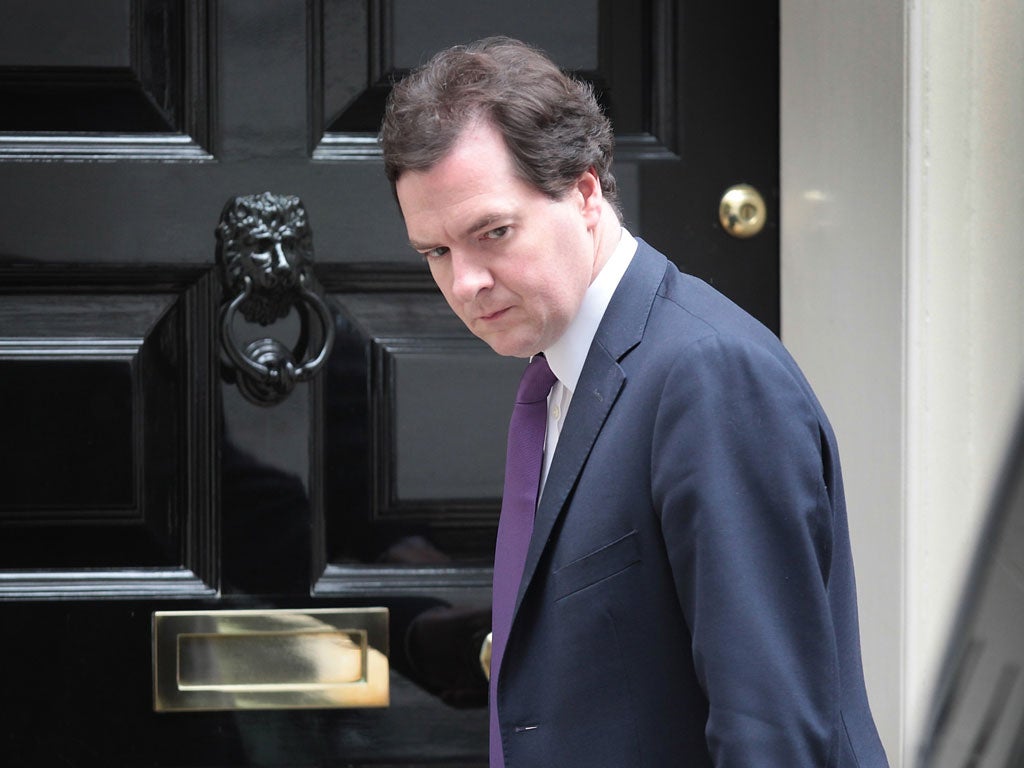Lawson: Chancellor must focus on economy, not election tactics
Call comes against background of new figures showing deficit-reduction strategy is failing

George Osborne has been urged to stand down from his second job as David Cameron's strategy chief and concentrate on the economy by a key ally, as evidence mounts that his deficit-reduction strategy is being blown badly off course by the UK's double-dip recession.
The former Tory Chancellor, Lord Lawson, said that Mr Osborne should focus exclusively on his role at the Treasury, rather than attempting to mastermind a 2015 election victory for the Tories in his second job as chief Conservative electoral strategist.
"I think it might be sensible to give up the formal [strategy] role and focus exclusively on his job as Chancellor which is a tremendously important job," Mr Lawson told Radio 4.
The call has added weight because Lord Lawson is widely respected in the Conservative Party and advised Mr Osborne on his radical 2010 Budget.
"I think his last Budget was not his biggest success but I think he should continue in that job."
Meanwhile, fresh evidence emerged yesterday that Mr Osborne's deficit reduction effort is experiencing severe difficulties thanks to the weakening economy. The Office for National Statistics said that public sector borrowing in June came in at £14.4bn, £500m more than the same month last year. This was despite the Coalition's spending cuts and tax rises. Income and corporation tax receipts were lower than expected, while government spending was higher. VAT receipts, however, rose on last year.
In 2011-12 the Government borrowed £125.7bn, equivalent to around 8.3 per cent of GDP. At the time of the Budget in March the Chancellor's economic watchdog, the Office for Budget Responsibility, forecast that the Government will borrow £92bn over 2012-13. But, since March, data has shown the economy to be in a double-dip recession and public borrowing has consistently come in worse than expected, prompting economists to doubt whether the official borrowing target will be met.
"It is clear the recession is leading to a worsening of the UK's fiscal position and [this] raises more question marks over the effectiveness of the Government's austerity measures," said James Knightley of the Dutch Bank ING. Weaker growth is expected to depress tax revenues and increase welfare benefits payments due to higher-than-expected levels of unemployment.
The International Monetary Fund slashed its growth forecast for the UK economy this week from 0.8 per cent to 0.2 per cent, the biggest downgrade experienced by any advanced economy. The IMF predicted that the Government will not meet its fiscal target of cutting the public debt as a share of GDP by 2015-16. The international lender of last resort also said the Chancellor should slow the pace of his planned spending cuts next year if growth does not pick up, which would constitute the economic "Plan B" the Labour opposition has urged.
Rachel Reeves MP, Labour's shadow Chief Secretary to the Treasury, described the latest borrowing figures as "another damaging blow to David Cameron and George Osborne's failed economic plan". She said: "By choking off the recovery and pushing the economy into recession the Chancellor has ended up borrowing more – as we repeatedly warned."
But a Treasury spokesman countered that it is too early in the financial year to draw conclusions about public finances for the year as a whole.
Next week the ONS will release its first estimate of growth in the second three months of 2012, with most economists expecting it to report another contraction.
Public borrowing
£13.9bn Public borrowing in June 2011.
£14.4bn Public borrowing in June 2012.
£92bn Borrowing target for 2012-13 – a goal that now appears unlikely to be met.
Join our commenting forum
Join thought-provoking conversations, follow other Independent readers and see their replies
Comments
Bookmark popover
Removed from bookmarks